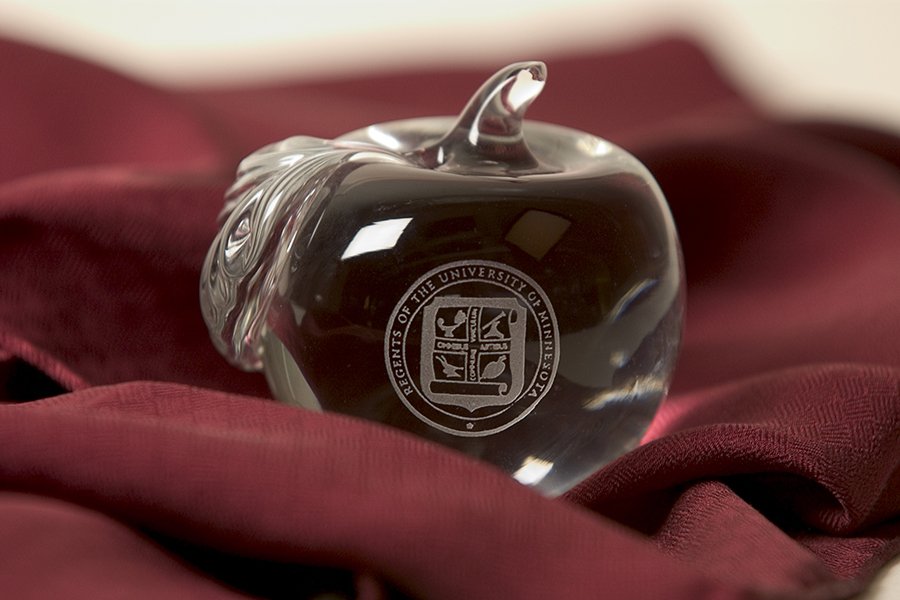Faculty and grad student earn collegiate awards in 2024

Impact on service, teaching, research recognized at annual reception
MINNEAPOLIS / ST. PAUL (04/29/2024)—Each year, the University of Minnesota College of Science and Engineering (CSE) recognizes its faculty and students for their outstanding accomplishments. On April 29, the CSE community celebrated the following 2024 collegiate honors: Guillermo W. Borja Career Development Award, George W. Taylor awards, and the Bowers family awards.
The recipients are:
Guillermo W. Borja Career Development Award
Qi Zhang, an assistant professor in the Department of Chemical Engineering and Materials Science, was recognized for his research and scholarly accomplishments in process systems engineering. Zhang joined the Twin Cities campus in 2018. Last year, Zhang earned a 2023-2025 McKnight Land-Grant Professorship. His work involves developing mathematical models and algorithms that inform decision-making or address complex problems ranging from the effective operation of electrified chemical processes to the design of sustainable energy supply chains.
George W. Taylor awards
These four awards, consisting of a citation and honorarium, are endowed within CSE in memory of George W. Taylor, a 1934 graduate of the Department of Mechanical Engineering.
George W. Taylor Career Development Award
Two School of Mathematics candidates for tenure were recognized for exceptional contributions to teaching:
Max Engelstein has been an assistant professor of mathematics at the University since August 2019. His research interest lies in analysis and PDE, but he has mostly worked on questions at the intersection of harmonic analysis, the calculus of variations and geometric measure theory. This spring, Engelstein is teaching “MATH 8602: Real Analysis,” one of the core graduate courses required of all Ph.D. students in mathematics.
William Leeb, who also earned the McKnight Presidential Fellow Award this year, joined CSE as an assistant professor in 2018. He researches the design and analysis of efficient algorithms that are robust to corruption of the input data. His work includes the development of new tools from multiple branches of mathematics and has led to fundamental contributions to the problems of matrix estimation, orbit recovery, and robust metric design. This spring, Leeb is teaching the four-credit introductory course in probability, “MATH 4653: Elementary Probability.”
George W. Taylor Award for Distinguished Research
Catherine Qi Zhao, an associate professor in the Department of Computer Science and Engineering was honored for her outstanding ability in research. She joined the University of Minnesota in 2016 and was promoted to an associate professor in 2021. Her work focuses on artificial intelligence, computer vision, machine learning, and AI for humans. Among Zhao’s recent projects: developing a novel machine learning model for quantitative, objective, and rapid evaluation of mental health, and partnering with Seagate to pioneer AI-enabled smart manufacturing in response to the national chip shortage in the semiconductor industry.
George W. Taylor Award for Distinguished Service
William “Bill” Arnold, a Distinguished McKnight University Professor in the Department of Civil, Environmental, and Geo- Engineering, was recognized for outstanding service to the University and voluntary public service to governmental or other public groups. His research focuses on water pollutants, specifically how organic pollutants—such as industrial solvents, pesticides, and pharmaceuticals—behave in natural systems (lakes, rivers) and engineered systems (drinking water pipes, treatment technologies for contaminated waters). Current projects include the study of antibiotics and antibiotic-resistance genes as pollutants.
George W. Taylor Award for Distinguished Teaching
Matt Johnson, a professor in the Department of Biomedical Engineering, was recognized for outstanding contributions to undergraduate and/or graduate teaching. The honor includes funds that can be used for professional development in teaching and research. Johnson, also a scholar in the Institute for Translational Neuroscience at the Medical School, leads the Neuromodulation Research and Technology Lab that focuses on technologies to improve the quality of life for people with neurological disorders, including movement and psychiatric disorders.
Bowers family awards
These two awards were endowed by alumnus John Bowers (Physics ’76):
Charles E. Bowers Faculty Teaching Award
Established in 2000 to honor his father, this award recognizes an outstanding professor who has demonstrated exceptional interest and commitment to the teaching of students in CSE. Julianna Abel, an associate professor in Department of Mechanical Engineering, is the 2024 recipient. Abel teaches a variety of courses. They include “ME 3222: Mechanisms and Machine Design” and “ME 8243: Topics in Design-Advanced Materials.” In addition to the classroom, she mentors students—both undergraduate and graduate—in research. Abel directs the Design of Active Materials and Structures Lab, where her team weaves smart materials into fabric for novel uses.
John Bowers Excellence in Teaching Assistance Award
Established in 2003, this award honors an outstanding teaching assistant who has demonstrated exceptional interest and commitment to the teaching of CSE students. This year’s recipient, Virginia Gali, is a graduate student in the School of Physics and Astronomy. Gali has worked as a teaching assistant instructing hundreds of students. Gali has also served as an officer in the Women and Gender Minorities in Physics and Astronomy (W+iPA) student group that provides academic and social support to women and gender minority graduate students.
